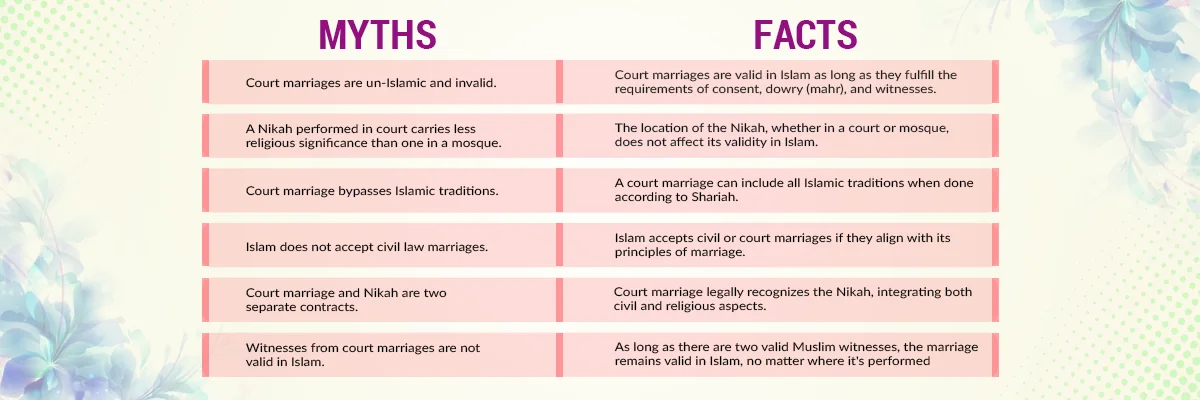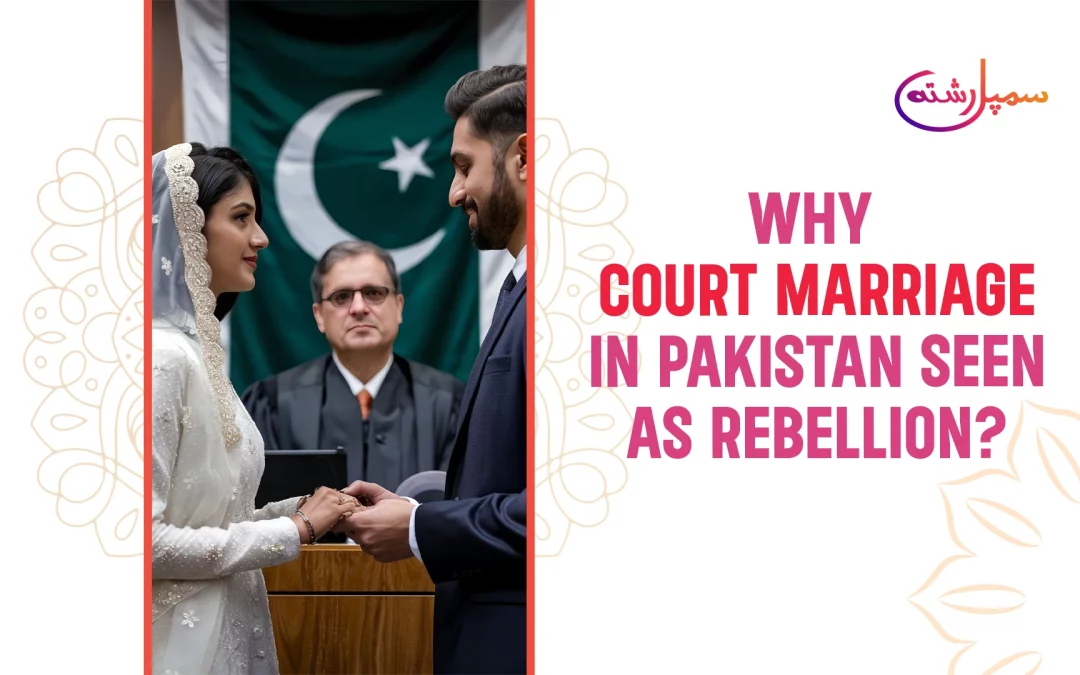Marriage is a major topic of discussion in our society, especially when it comes to finding the right match and deciding the timing. Often, when a good proposal comes along, it sparks disagreements within families. If the father likes the proposal, the mother might reject it. Even if both parents agree, siblings might create a fuss. On top of that, many families have strict preferences for matchmaking based on caste, ethnicity, or sect. Some families insist on marrying within their community. Which makes many young people consider court marriage in Pakistan as an alternative, even though it may come with its own challenges.
The younger generation tends to focus more on Similar values, mindsets, and common goals in a relationship, rather than following traditional norms. Our new generation is more practical. They may not fully grasp the reasons behind marrying within the same caste or community. Because they value compatibility and mutual understanding more. As a result, some individuals opt for court marriage. Which is often seen as a rebellious act against familial expectations.
However, not all court marriages happen out of rebellion. Many young people have different reasons for choosing this path. Unfortunately, in Pakistan, court marriage is often taken as an act of defiance against family traditions, even though the reasons behind it are not always so simple.
What is court marriage?
Court marriage is a legal process where two individuals choose to formalize their relationship through civil means. It is often without the involvement of family or religious institutions or ceremonies. Unlike traditional weddings, court marriages focus only on the legal part of marriage. This type of marriage is open to people of any religion, caste, or nationality. A marriage officer or a legal official conducts the process. It takes place in the presence of witnesses, making sure it follows the country’s laws.
Misconceptions about Court Marriage in Pakistan
- One of the biggest misconceptions is that court marriage is an act of defiance against family and tradition. While some couples may choose court marriage to bypass family opposition, many others do it for convenience or personal choice.
- Some people mistakenly believe that court marriages are not recognized under Pakistani law. In fact, court marriages are completely legal and provide the couple with a valid marriage certificate.
- There’s a perception that court marriage is only for young people who run away from home, but that’s not true. Couples of all ages and backgrounds choose court marriage, often for financial reasons or to skip elaborate ceremonies.
- Many think court marriages exclude religious elements entirely. While the legal process is secular, couples can still have religious rituals alongside or after the court marriage if they choose.
- While court marriages can sometimes lead to family conflict, this is not always the case. Many couples maintain healthy relationships with their families even after opting for court marriage.
- While it is true that court marriage provides an option for couples of different faiths or castes, it is also chosen by people within the same religion or community who prefer a simple and legal procedure over traditional customs.
Reasons for Court Marriage in Pakistan
There are several reasons why individuals in Pakistan opt for court marriage:
1. Family Opposition
One of the primary reasons people choose court marriage in Pakistan is to circumvent family opposition. Many families have strict expectations regarding marriage. They often prioritize factors like caste, ethnicity, sect, and family background. When individuals fall in love with someone who doesn’t meet these criteria, they may face pressure to finish the relationship. To bypass this opposition, many couples choose court marriage as a way to legally bind themselves without the need for family approval.
2. Caste and Sect Boundaries
In Pakistan, caste and sect still play a significant role in matchmaking. Marrying outside one’s caste or sect is seen as breaking a long-standing tradition. Which leads to strong disapproval from families and communities. Court marriage becomes an option for those who wish to do love marriage and prioritize love and understanding rather than caste or sect-based considerations.
3. Interfaith Marriages
While Pakistan is predominantly Muslim, there are other religious minorities in the country. Interfaith marriages, though rare, can happen. Since traditional religious ceremonies may not cater to mixed-faith couples, court marriage provides a secular and legally recognized way for couples from different religions to marry.
4. Women’s Right to Decide
In Pakistan, some women may feel that their families restrict their choices. In a society that values family honor over personal desires, court marriage can be a way for women to take control of their lives and marry someone they love. This choice is seen as a brave step, especially in conservative areas where arranged marriages are common.
5. Economic Independence
Many young people in Pakistan today are more economically independent than previous generations. As a result, they want to make their own life decisions, including whom to marry. Court marriage allows them to take control of their personal lives without needing to adhere to their family’s wishes.
6. Moving Abroad
Many individuals wish to move to other countries for better opportunities and quality of life. In pursuit of this dream, they may consider various options, including inter-religion marriages or paper marriages. In such cases, both partners often plan their futures together and choose to enter into a court marriage. This trend is on the rise in Pakistan, as more couples see court marriage as a practical step to facilitate their relocation and secure their future together.
Court marriage in Pakistan provides a legal foundation that can help couples navigate immigration processes, making it a strategic choice for those looking to settle abroad. By formalizing their relationship, they can address the legal requirements necessary for obtaining visas and residency permits. This increasing trend highlights how personal aspirations and the desire for a better life can influence marital choices in Pakistan.
7. Avoiding Extravagant Weddings
Traditional weddings in Pakistan can be incredibly expensive. Because there are multiple ceremonies, lavish decorations, and huge guest lists that can reach hundreds of people. Some couples prefer a simple court marriage to lessen the financial burden that comes with a traditional wedding. This is especially true for those who wish to save money or who do not see the value in spending large sums on a wedding.
Court Marriage in Pakistan vs Other Countries:
Court marriage, or civil marriage, happens in many countries, but people see it differently based on their culture or religion.
Western Countries
In many Western countries, such as the United States, Canada, and European nations, court marriages are common. They are seen as a personal choice and are not associated with rebellion. Couples who do not want a religious ceremony or those from different religious backgrounds select the option of court marriage. In these countries, marriage is seen as a legal contract, and the form of the ceremony is often less important than the legal implications.
India
In neighboring India, court marriage is also a legal option. It is common between people who wish to marry outside of their caste, religion, or without family consent. While it is seen as a practical solution in cities, court marriages in rural areas are still taken as a defiance of family norms, much like in Pakistan.
Middle Eastern Countries
In many Middle Eastern countries, court marriage is legal but is not very common due to the strong influence of religious laws in matters of marriage. Families arrange marriages, and they follow important religious customs. Court marriage, in this context, may be seen as going against traditional practices, but it doesn’t carry as much stigma as in Pakistan.
African Countries
In some African countries, people view court marriages as a modern alternative to traditional and religious ceremonies. However, their acceptance depends on the cultural context; some see them as rebellious, while others do not. In many urban areas, people see court marriages as a convenient and legally binding option.
Court marriage in Islam
The Court marriage in Islam is permissible if it fulfills the basic requirements of an Islamic marriage (Nikah). These include mutual consent of both parties, presence of witnesses, and the offering of Mahr (dowry) to the bride. While the legal procedures vary by country, the key aspect is that the marriage must align with Islamic principles, and both parties must agree willingly. However, cultural and familial traditions may sometimes conflict with the idea of court marriages, especially when it bypasses the family’s involvement in the process.
Court Marriage in Islam: Myths vs. Facts

Process of Court Marriage in Pakistan: Step-by-Step Guide
- Both individuals must be of legal age (18 years for women, 21 years for men).
- Candidates must willingly agree to the marriage without any coercion.
- Both individuals need to provide their National Identity Cards (NIC) for verification.
- Two adult witnesses must be present at the time of the marriage.
- The couple files an application for court marriage with the marriage registrar or a court-appointed officer.
- Pay any applicable registration fees.
- Both individuals must confirm their consent that they want to marry.
- After the verification and with witnesses present, they register the marriage and issue a marriage certificate (Nikah Nama).
- In some cases, a judge may require the couple to appear before them for questioning about their intentions and understanding of the marriage contract.
- The registrar conducts a simple marriage ceremony with witnesses present.
- The couple and witnesses will sign the marriage certificate.
- After signing, the couple will receive a marriage certificate, which serves as legal proof of the marriage.
Additional Considerations for Inter-Religion Marriages
Inter-religion marriages may face more scrutiny and legal challenges. Couples must comply with specific requirements of their respective religions. As family acceptance can be more challenging in inter-religion marriages. Additionally, Societal attitudes toward inter-religion marriages can vary and may affect the couple’s relationship.
If one partner is Muslim, they might need to state their intention.
- If the non-Muslim partner decides to convert, they may need a conversion certificate.
- The couple may want to register their marriage with their religious authorities, depending on their religions.
Conclusion
In Pakistan, the term “court marriage” often carries a negative stigma. Many people think court marriage is something children do to mislead their parents or see it as a sign of poor upbringing. However, court marriage is a normal and valid choice.
In our society, especially within the Muslim community, we should adhere to Islamic principles. Marriage should not be limited by caste, community, or sect. In fact, a man can marry a woman from another religion if she belongs to the Ahl-e-Kitab under certain conditions.
Moreover, the consent of both individuals, especially the woman, is essential before marriage. If parents and families focus on their children’s choices and involve them in decision-making, young people will be less likely to choose court marriage. When court marriages do occur, we must take it positively. If two adults choose to marry, we have to accept their decision wholeheartedly.



Well, who knew court marriage could be the ultimate plot twist in a family drama! 😂 This blog gives such a refreshing perspective on something that’s often misunderstood.